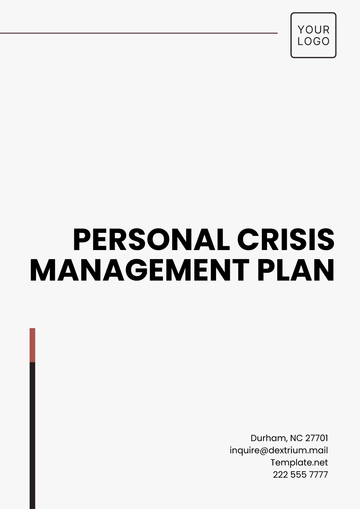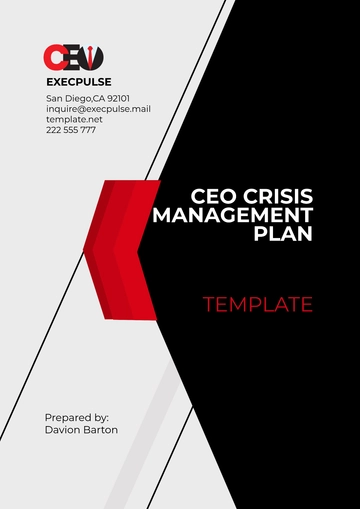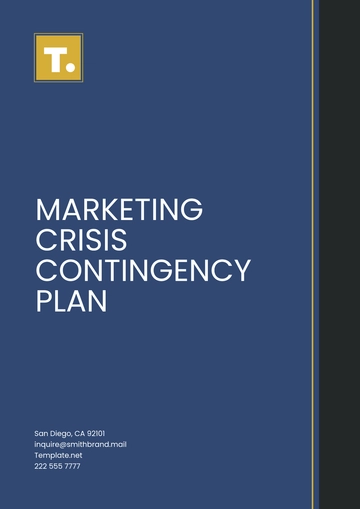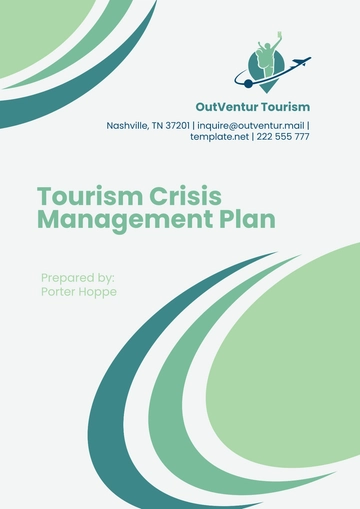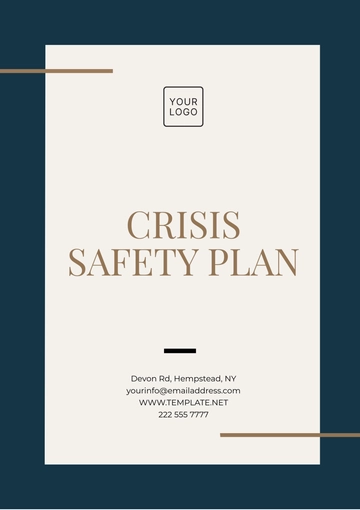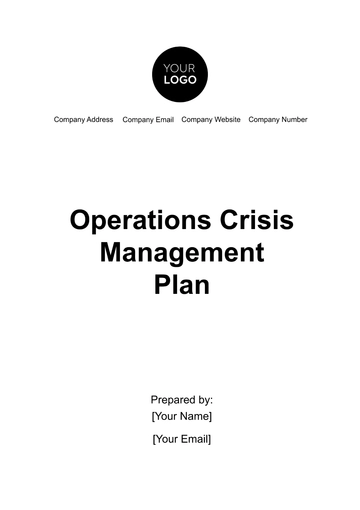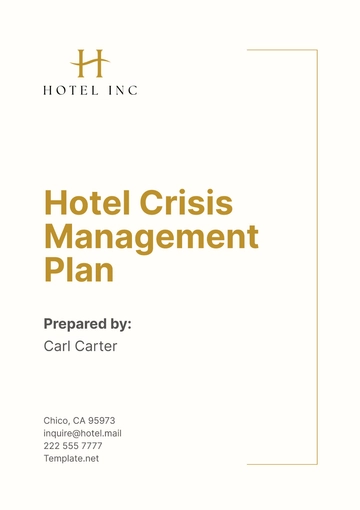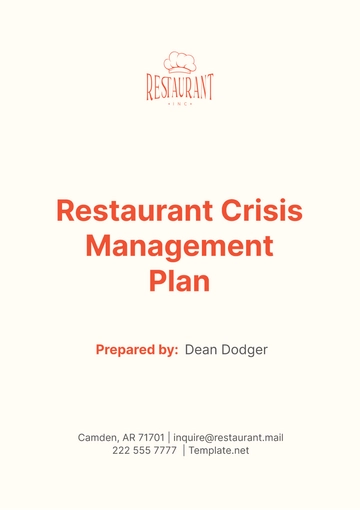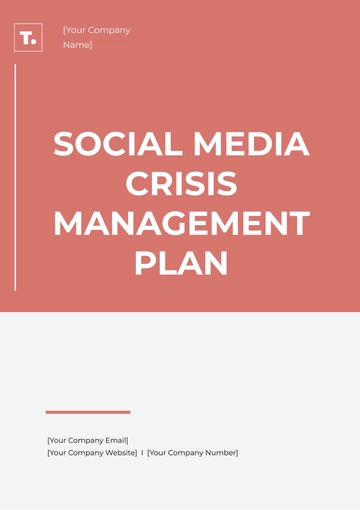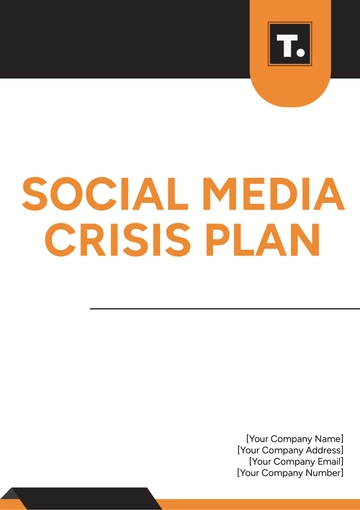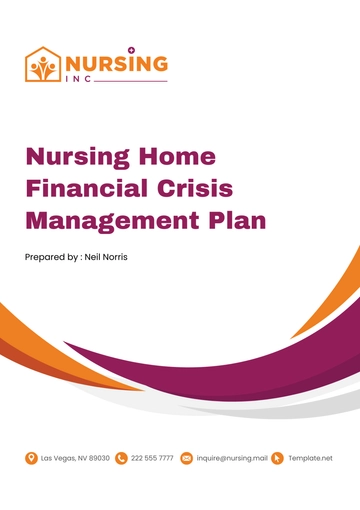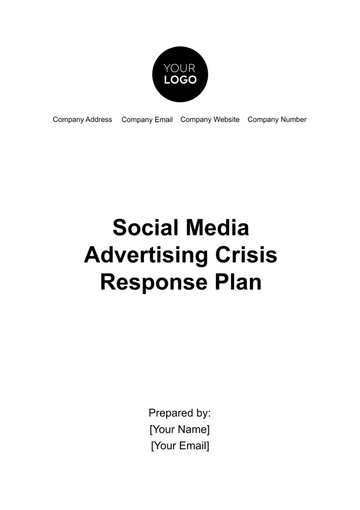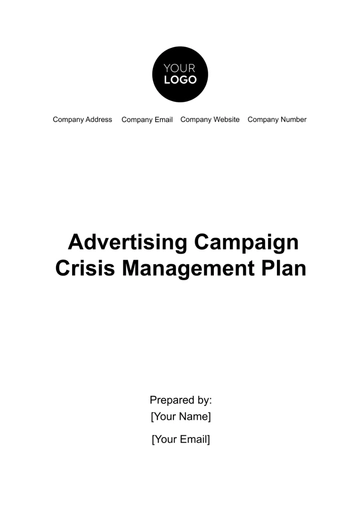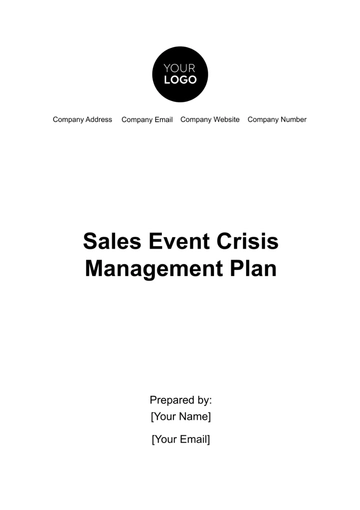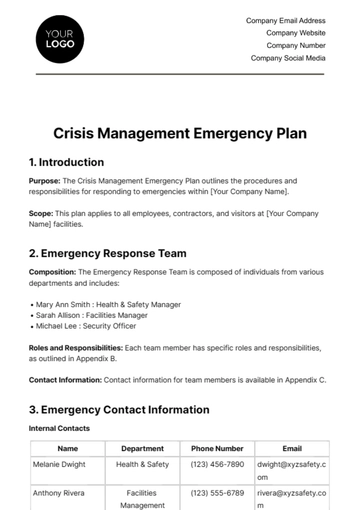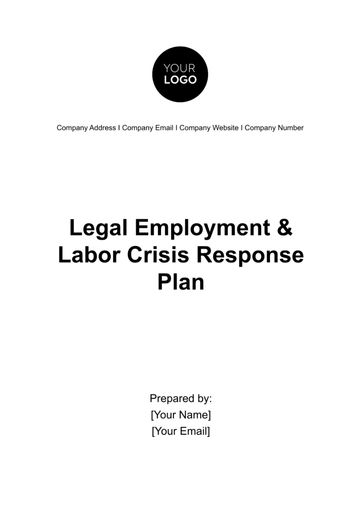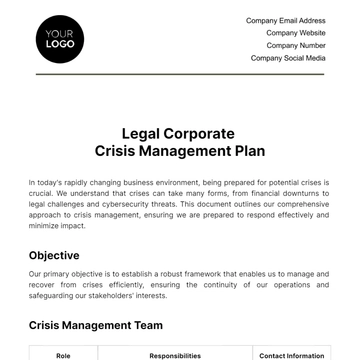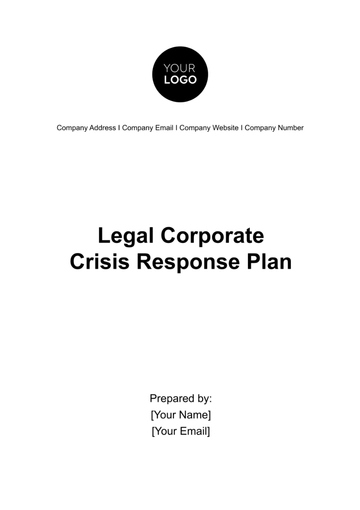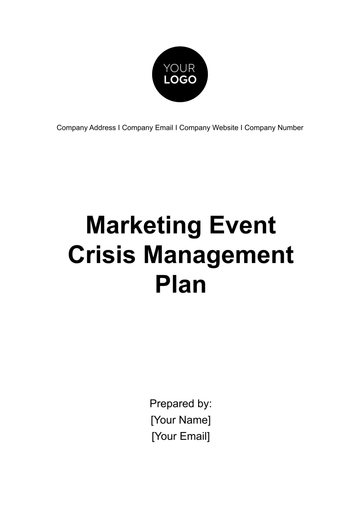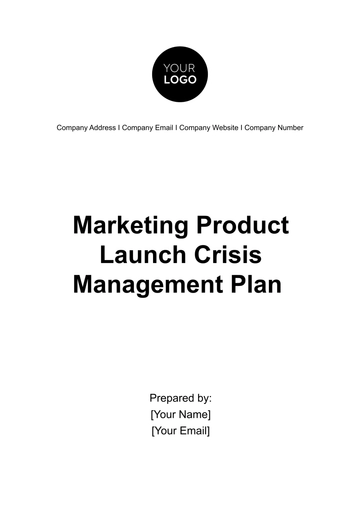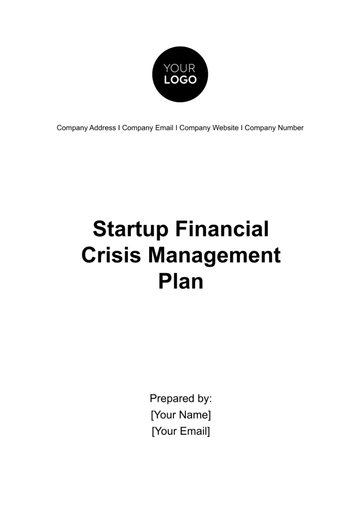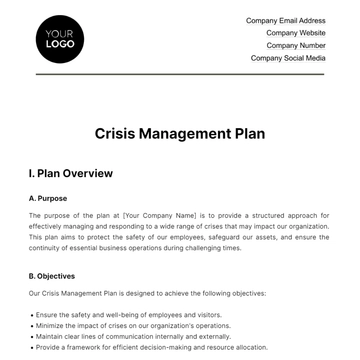Free Personal Crisis Management Plan
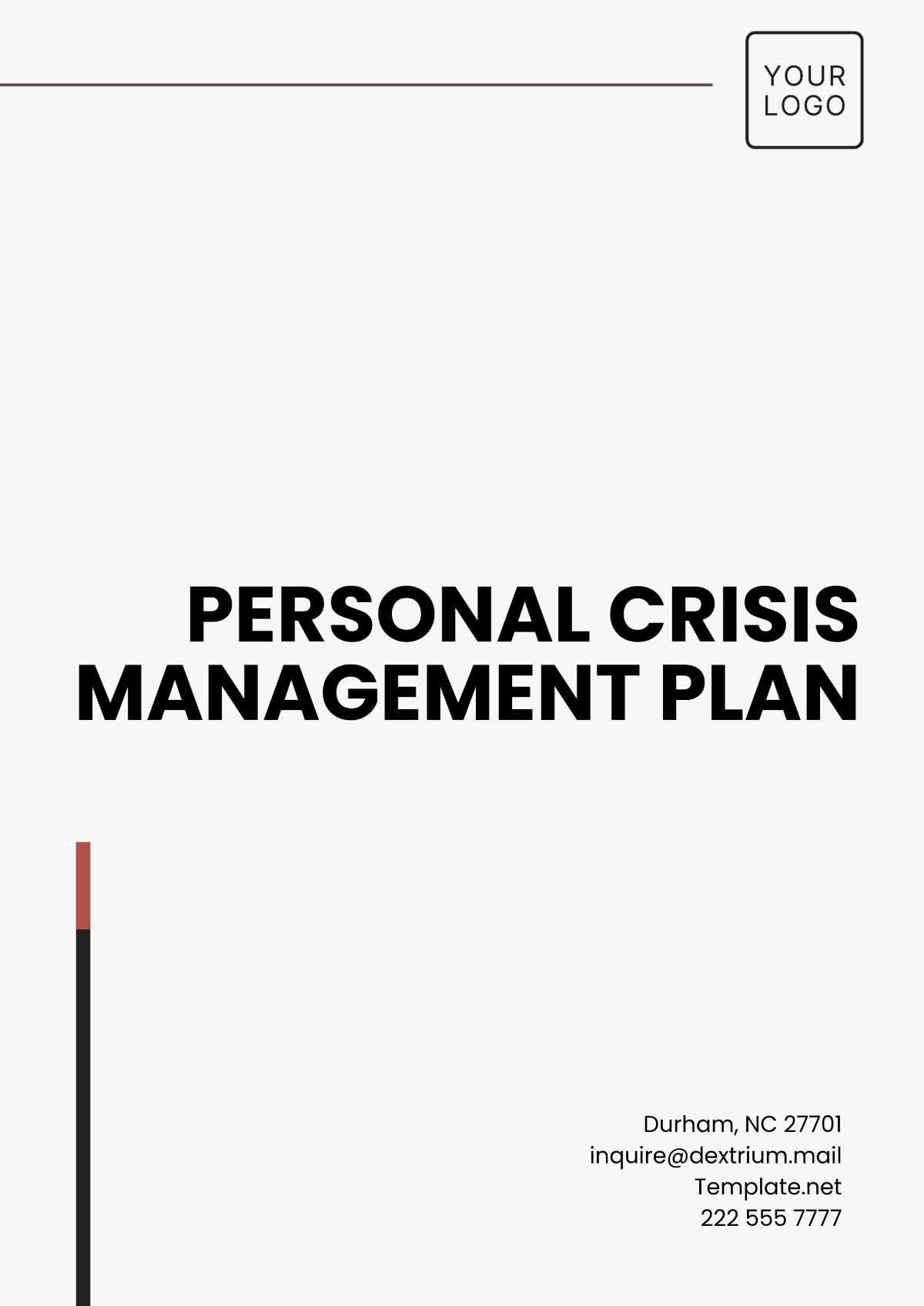
Prepared by: [Your Name]
I. Introduction
A Personal Crisis Management Plan (PCMP) is a comprehensive strategy designed to help individuals respond effectively to crises that may arise in their personal lives. Crises can come in many forms, including unexpected health issues, financial instability, or personal losses. This plan will ensure that you are prepared, organized, and able to maintain stability during times of upheaval. The goal of this plan is to minimize the impact of a crisis, ensure quick recovery, and provide peace of mind during uncertain times.
II Crisis Identification
Understanding the types of crises that may impact your life is essential to preparing for them. Below are common types of crises you should identify in your plan:
A. Health Emergencies
Health issues, whether chronic or sudden, can create a significant crisis. Consider how you will respond to situations such as:
A sudden illness or injury
A medical emergency (e.g., stroke, heart attack)
Chronic disease flare-ups
Mental health crises (e.g., anxiety, depression)
B. Financial Difficulties
Financial crises can arise from unexpected job loss, poor investments, or unforeseen expenses. These challenges might include:
Job layoffs or sudden income loss
Bankruptcy or mounting debt
Unexpected medical or legal bills
Significant life changes (e.g., divorce, relocation)
C. Natural Disasters
Natural events such as floods, earthquakes, or severe weather can disrupt your daily life. Being prepared for:
Evacuation plans
Home and car insurance reviews
Emergency preparedness kits (food, water, flashlight)
Local disaster response information
D. Personal Loss or Trauma
Loss, such as the death of a loved one or the breakdown of a significant relationship, can trigger emotional crises. Prepare for:
Grieving and emotional processing
Adjusting your daily life and responsibilities
Seeking counseling or support groups
E. Relationship Issues
Difficult relationships, whether romantic, familial, or social, may result in crises. Consider how to handle:
Conflict resolution with family or friends
Divorce or separation
Parenting challenges
III. Immediate Response
When a crisis strikes, immediate action is critical to preventing further damage and ensuring your safety.
A. Stay Calm and Assess the Situation
It is essential to remain composed, as panic can lead to poor decision-making. Try the following:
Take deep breaths to calm your nerves.
Determine the severity of the situation and what actions need to be taken immediately.
B. Contact Emergency Services if Necessary
For crises like health emergencies or natural disasters, contacting appropriate services (e.g., paramedics, and firefighters) can save lives. Have emergency numbers readily available, including:
911 or local emergency contacts
Poison control, mental health crisis hotlines
C. Inform Close Family or Friends for Support
Having a support system during a crisis is vital. Let close family members or friends know what’s happening. If you're unable to handle everything on your own, let them take over some responsibilities, like child care or pet sitting.
D. Secure Your Physical Safety and Environment
Ensure your safety in the immediate aftermath:
Evacuate if necessary (e.g., during a fire or natural disaster).
Secure your home by locking doors, closing windows, and shutting off utilities if appropriate.
If indoors, seek shelter in a safe area away from danger.
IV. Support System
Having a robust support system is crucial when managing a crisis. Your network can help provide both emotional and practical assistance.
A. Family Members and Close Friends
Family members and close friends can be a source of emotional support and assistance. Make a list of people who can help you during different types of crises. For example:
A family member to care for children or pets
A close friend to help with errands or emotional support
B. Medical Professionals or Therapists
Having a mental health or physical care team in place is essential, particularly during health-related crises:
Your primary care physician for medical emergencies
A therapist for mental health support
A counselor for relationship issues or trauma
C. Financial Advisors or Emergency Services
During financial crises, reaching out to:
A financial advisor to assess your financial standing and recommend strategies
Debt relief or government assistance programs if necessary
D. Community or Spiritual Support Groups
Sometimes, your immediate circle of family and friends may not suffice. In those cases, turning to a local community group or spiritual support network can provide additional relief.
V. Communication Plan
Clear communication is essential for managing any crisis. In times of distress, ensuring that you and your loved ones can reach each other is crucial.
A. Key Contacts (Names, Phone Numbers, Email Addresses)
List the people who need to be informed in case of a crisis. For example:
Immediate family: John Doe (spouse), Jane Doe (mother), Sarah Doe (sister)
Close friends: Mark Johnson (friend), Emily Baker (neighbor)
Key professionals: Dr. Smith (primary care physician), Jenny Fields (therapist)
B. Methods of Communication (Phone, Text, Email)
Decide on the preferred methods of communication in a crisis:
Text messages for quick updates
Phone calls for more detailed conversations
Email for formal communications (e.g., with lawyers or financial advisors)
C. Designate a Point Person to Update Others
In case you are overwhelmed during the crisis, assign one trusted person to be the main communicator. This person can relay information to other contacts and reduce the emotional burden on you.
VI. Emotional and Mental Health
Coping with the emotional impact of a crisis is just as important as managing the physical or financial aspects.
A. Practice Mindfulness or Meditation Techniques
Mindful breathing exercises to center yourself
Short meditation sessions to reduce anxiety and stress
B. Keep a Journal to Express Thoughts and Feelings
Journaling can help process emotions during tough times. Write down your fears, hopes, or steps you're taking to recover.
C. Seek Professional Help (Therapist, Counselor) if Needed
Don’t hesitate to seek professional support. A therapist or counselor can offer a safe space to talk through your emotions and provide coping strategies.
D. Engage in Stress-Relieving Activities Like Exercise or Hobbies
Exercise or activities you enjoy (e.g., painting, reading, gardening) can help alleviate stress and provide a sense of normalcy.
VII. Financial Preparedness
Financial stability during a crisis can make or break recovery efforts.
A. Keep an Emergency Fund for Unexpected Expenses
Try to save 3–6 months’ worth of living expenses in a separate, easily accessible account.
Invest in liquid assets, like a savings account, for quick access in an emergency.
B. Identify Financial Resources, Such as Insurance or Savings
Ensure your health insurance, home insurance, and life insurance policies are up-to-date and adequate to cover possible emergencies.
C. Create a Budget for Managing Expenses During the Crisis
Cut down on unnecessary expenses.
Focus on essentials like food, housing, utilities, and transportation.
Set up automatic payments for crucial bills.
D. Contact Creditors for Temporary Relief if Necessary
If you're facing financial challenges, contact your creditors to explain the situation. Many companies offer deferred payments or payment plans during a crisis.
VIII. Safety Measures
Physical safety should be a priority in any crisis, particularly during emergencies like fires, natural disasters, or accidents.
A. Identify Safe Places in Your Home or Workplace
Designate a safe room in case of a fire or natural disaster.
Ensure everyone in your household knows the safe escape routes.
Keep a list of emergency exits and evacuation plans for workplaces.
B. Prepare a Disaster Kit with Necessary Supplies
Non-perishable food and water for at least three days
First-aid kit with medications
Flashlights, batteries, and other emergency tools
C. Plan Evacuation Routes and Emergency Contacts
Have an emergency evacuation route planned for your home or office. Share this plan with family members, and make sure everyone knows how to get to a safe location.
IX. Long-Term Recovery
After the crisis, long-term recovery will involve both physical and emotional rebuilding.
A. Evaluate the Impact on Your Long-Term Goals and Adjust Accordingly
After a crisis, reflect on how your long-term goals may have changed. Whether it’s adjusting your career trajectory or prioritizing personal well-being, be ready to realign your objectives.
B. Seek Professional Help for Ongoing Emotional Recovery
Grief and trauma may require ongoing counseling. Continue seeking support to rebuild mental resilience after the immediate crisis is over.
C. Focus on Maintaining a Balanced Lifestyle as You Regain Stability
Even in recovery, prioritize balance by:
Maintaining a healthy diet and exercise routine
Keeping up with relationships and hobbies
Continuing to work on financial and emotional recovery
X. Review and Update Plan
A crisis management plan should be a living document. Regularly reviewing and updating it will ensure that it remains relevant as your life evolves.
A. Reflect on Any Changes in Your Circumstances
Has your health, financial situation, or family dynamic changed?
Update emergency contacts or key professionals as necessary.
B. Adjust Your Emergency Contacts and Resources as Needed
Revisit your support system to ensure it aligns with your current situation. If you move to a new city, change jobs, or experience significant life events, update your plan accordingly.
C. Review the Plan Annually or After Major Life Events
Set a calendar reminder to review your plan every year. After major life events, such as a new job, marriage, or the birth of a child, make adjustments as necessary.
- 100% Customizable, free editor
- Access 1 Million+ Templates, photo’s & graphics
- Download or share as a template
- Click and replace photos, graphics, text, backgrounds
- Resize, crop, AI write & more
- Access advanced editor
Stay prepared with the Personal Crisis Management Plan Template from Template.net. This editable and customizable template helps you create a structured response plan for personal crises, including financial, emotional, or health-related emergencies. Modify it quickly using our Ai Editor Tool to address specific challenges in your life and ensure you're ready for the unexpected.
You may also like
- Finance Plan
- Construction Plan
- Sales Plan
- Development Plan
- Career Plan
- Budget Plan
- HR Plan
- Education Plan
- Transition Plan
- Work Plan
- Training Plan
- Communication Plan
- Operation Plan
- Health And Safety Plan
- Strategy Plan
- Professional Development Plan
- Advertising Plan
- Risk Management Plan
- Restaurant Plan
- School Plan
- Nursing Home Patient Care Plan
- Nursing Care Plan
- Plan Event
- Startup Plan
- Social Media Plan
- Staffing Plan
- Annual Plan
- Content Plan
- Payment Plan
- Implementation Plan
- Hotel Plan
- Workout Plan
- Accounting Plan
- Campaign Plan
- Essay Plan
- 30 60 90 Day Plan
- Research Plan
- Recruitment Plan
- 90 Day Plan
- Quarterly Plan
- Emergency Plan
- 5 Year Plan
- Gym Plan
- Personal Plan
- IT and Software Plan
- Treatment Plan
- Real Estate Plan
- Law Firm Plan
- Healthcare Plan
- Improvement Plan
- Media Plan
- 5 Year Business Plan
- Learning Plan
- Marketing Campaign Plan
- Travel Agency Plan
- Cleaning Services Plan
- Interior Design Plan
- Performance Plan
- PR Plan
- Birth Plan
- Life Plan
- SEO Plan
- Disaster Recovery Plan
- Continuity Plan
- Launch Plan
- Legal Plan
- Behavior Plan
- Performance Improvement Plan
- Salon Plan
- Security Plan
- Security Management Plan
- Employee Development Plan
- Quality Plan
- Service Improvement Plan
- Growth Plan
- Incident Response Plan
- Basketball Plan
- Emergency Action Plan
- Product Launch Plan
- Spa Plan
- Employee Training Plan
- Data Analysis Plan
- Employee Action Plan
- Territory Plan
- Audit Plan
- Classroom Plan
- Activity Plan
- Parenting Plan
- Care Plan
- Project Execution Plan
- Exercise Plan
- Internship Plan
- Software Development Plan
- Continuous Improvement Plan
- Leave Plan
- 90 Day Sales Plan
- Advertising Agency Plan
- Employee Transition Plan
- Smart Action Plan
- Workplace Safety Plan
- Behavior Change Plan
- Contingency Plan
- Continuity of Operations Plan
- Health Plan
- Quality Control Plan
- Self Plan
- Sports Development Plan
- Change Management Plan
- Ecommerce Plan
- Personal Financial Plan
- Process Improvement Plan
- 30-60-90 Day Sales Plan
- Crisis Management Plan
- Engagement Plan
- Execution Plan
- Pandemic Plan
- Quality Assurance Plan
- Service Continuity Plan
- Agile Project Plan
- Fundraising Plan
- Job Transition Plan
- Asset Maintenance Plan
- Maintenance Plan
- Software Test Plan
- Staff Training and Development Plan
- 3 Year Plan
- Brand Activation Plan
- Release Plan
- Resource Plan
- Risk Mitigation Plan
- Teacher Plan
- 30 60 90 Day Plan for New Manager
- Food Safety Plan
- Food Truck Plan
- Hiring Plan
- Quality Management Plan
- Wellness Plan
- Behavior Intervention Plan
- Bonus Plan
- Investment Plan
- Maternity Leave Plan
- Pandemic Response Plan
- Succession Planning
- Coaching Plan
- Configuration Management Plan
- Remote Work Plan
- Self Care Plan
- Teaching Plan
- 100-Day Plan
- HACCP Plan
- Student Plan
- Sustainability Plan
- 30 60 90 Day Plan for Interview
- Access Plan
- Site Specific Safety Plan
